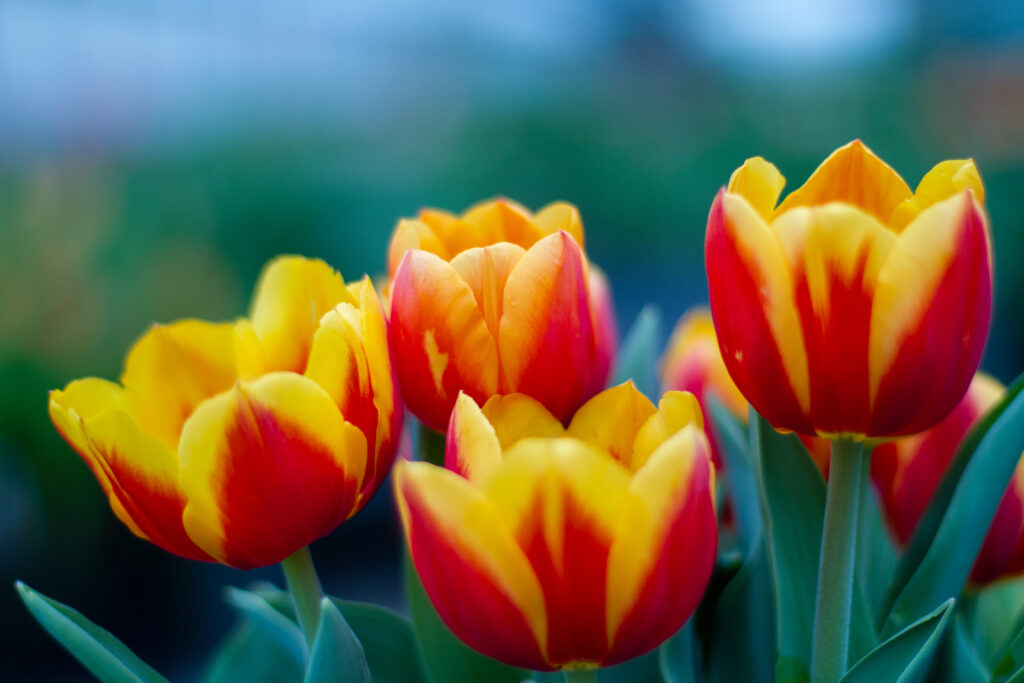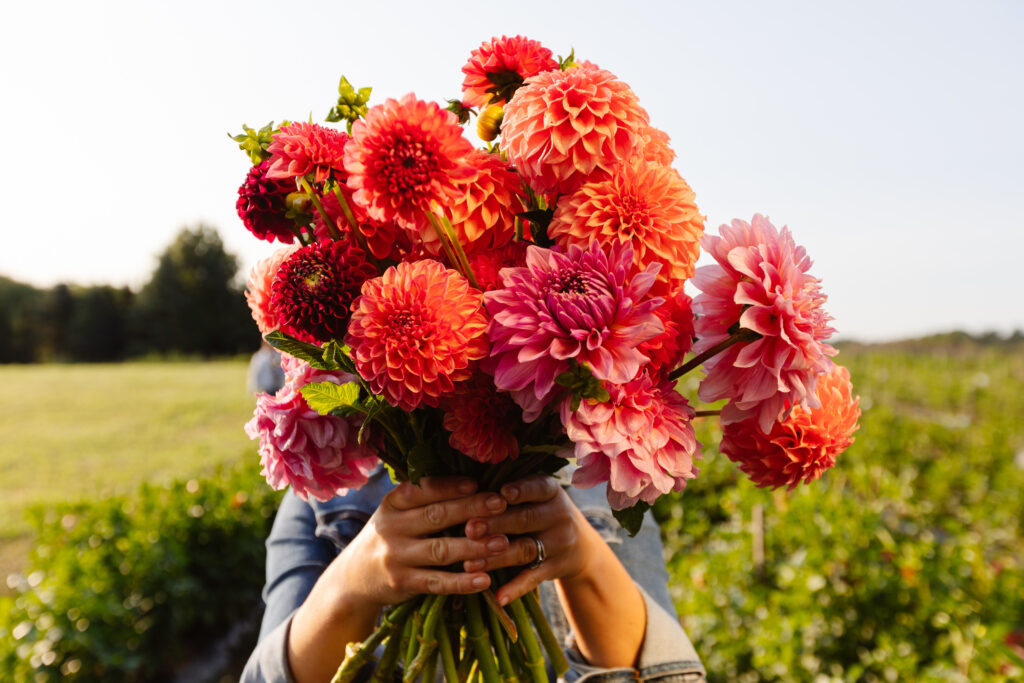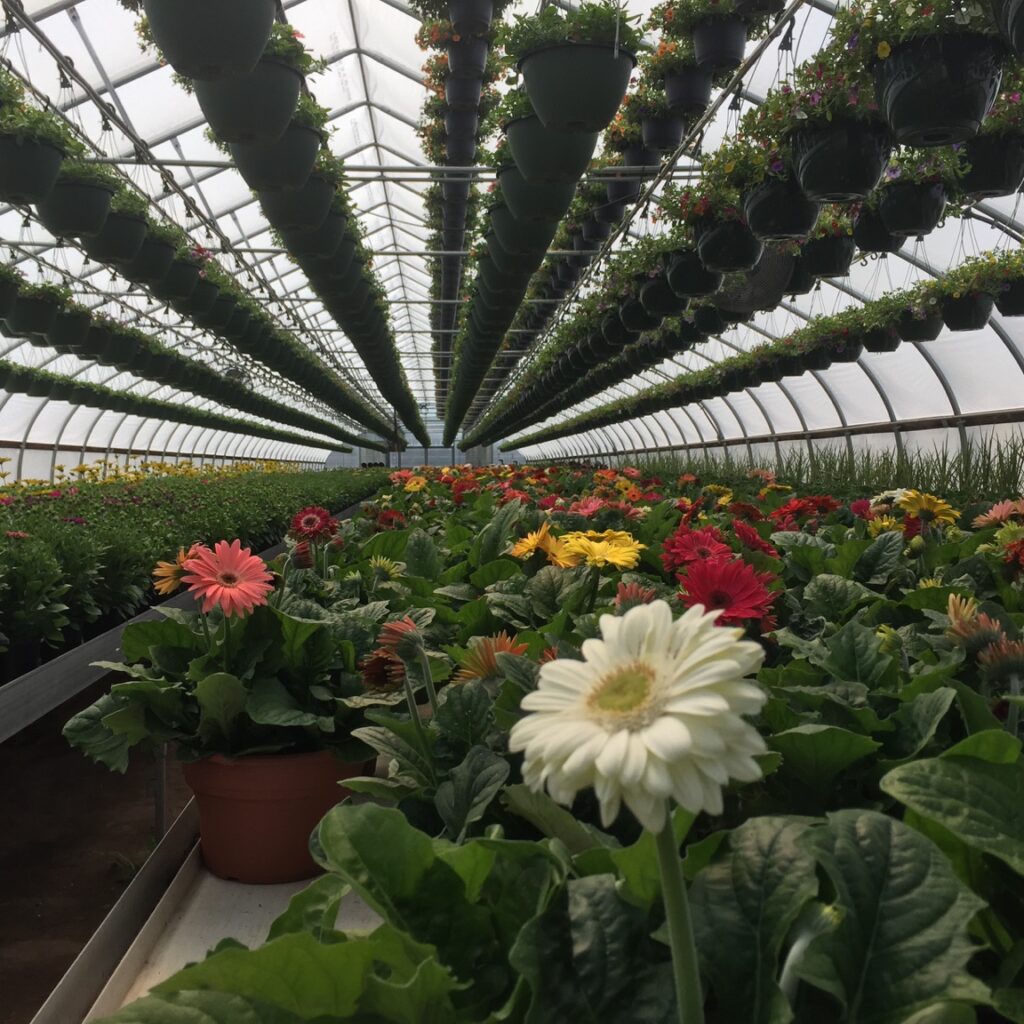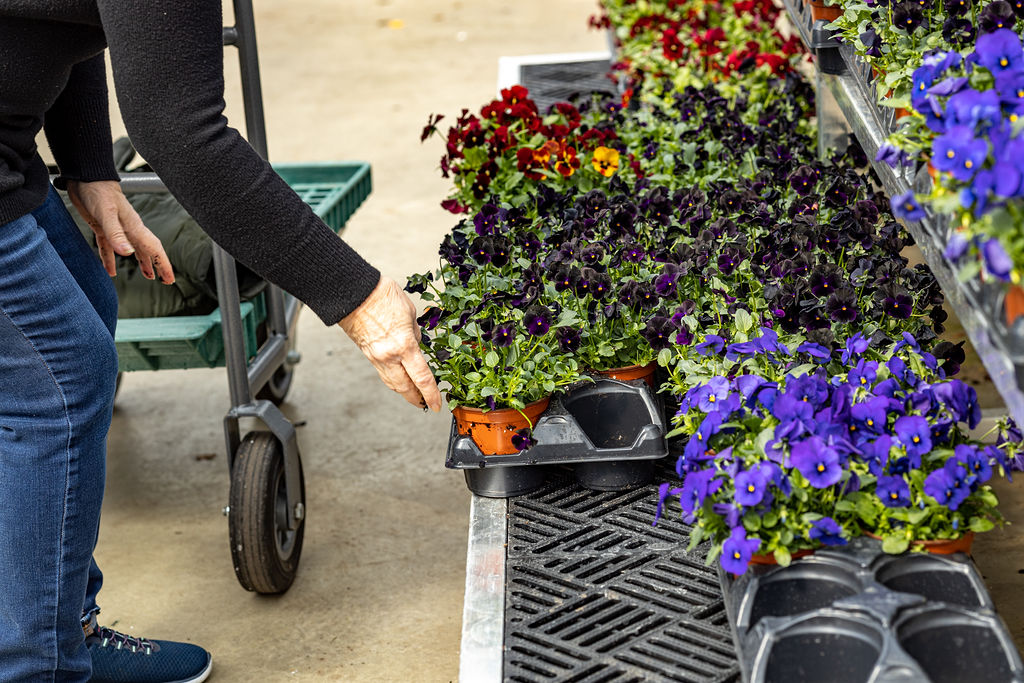The spring season brings a welcome return of color to the Connecticut landscape, with warming temperatures signaling the start of a new growing season. We’re taking off our winter coats, starting preparations for our home gardens, and marking our calendars to get a bouquet for Mother’s Day.
It all makes for a busy time for CT Grown greenhouses, nurseries, and flower and sod producers. Across Connecticut this spring, you’ll find cut flowers, potted plants, bedding plants, hanging baskets, and more to make your home and garden beautiful this year.
This guide will share some of the amazing flowers grown locally, and give you tips on where to find them.


Perennial flowers
Perennials are a favorite among gardeners because they return year after year and don’t need to be replanted. An underground structure, such as a bulb, allows them to stay dormant over the winter and regrow in the spring.
Popular options for spring-flowering perennials in Connecticut include:
- Alliums
- Asters
- Coneflowers
- Cranesbill geraniums
- Daffodils
- Foxglove
- Hyacinth
- Irises
- Lavender
- Peonies
- Phlox
- Tulips
Once the risk of a final spring frost has passed, you can also plant bulbs for perennial flowers that will bloom in the summer. Some options include begonias, dahlias, and lilies.
Annual flowers
Annual flowers grow for a single season and need to be replanted each year. They work well alongside perennials, which usually have a shorter flowering period, and allow gardeners to experiment with new and interesting flowers each year. Some flowers are technically perennials, but are grown as annuals due to their shorter lifespan.
Some popular options for annuals that can be planted in the spring include:
- Calendulas
- Larkspur
- Marigolds
- Petunias
- Snapdragons
- Sunflowers
- Sweet alyssum
- Zinnias
Flowering shrubs
Flowering shrubs are large, woody perennial plants that are well-suited for landscaping purposes. They can be used not only to make your home more attractive, but also as a natural way to define property lines and create a privacy screen.
Some popular options for flowering shrubs in Connecticut include:
- Azaleas
- Forsythia
- Hydrangeas
- Lilacs
- Mountain laurel
- Rhododendrons
Flower farms
Some farms in Connecticut specialize in growing cut flowers, and spring allows them to start hosting pick-your-own occasions and other events.
One example is the “Dancing Daffodils” field at Halfinger Farms in Higganum, where visitors can collect the bright yellow flowers for 70 cents apiece. At Wicked Tulips in Preston, a ticketed pick-your-own event lets you stroll through the fields and collect 10 tulips; the farm also hosts Yoga in the Tulips events during the spring.
Farms may also grow flowers alongside their other crops, and these blooms have become an increasingly popular option for CSAs. These programs let you regularly pick up bouquets of freshly cut flowers, bringing a bright and aromatic addition to your home for several weeks. Traditional CSAs may also offer an add-on option for flowers.
Plant and seedling sales in Connecticut
While early spring is typically too cold to begin growing plants outdoors in Connecticut, you can get a head start by planting seeds indoors and transplanting them once it gets warmer. You can also find seedling and plant sales across the state that have already started this process for you.
Plant and seedling sales offer annual and perennial flowers as well as seedlings for herbs and vegetables. Some give a special focus to native plants — species that occur naturally in the region and thus are beneficial to the local ecosystem.
Sales are sometimes hosted by farms to help generate revenue early in the season. They are also a popular fundraiser for organizations like garden clubs and arboretums.
Some upcoming plant and seedling sales in Connecticut include:
- Connecticut River Coastal Conservation District 2023 Native Plant and Plug Sale, Chester, April 28-29, 2023
- Connecticut Horticultural Society Plant Sale & Auction, Berlin, May 5, 2023
- Hill and Dale Garden Club Plant Sale, Glastonbury, May 6, 2023
- Friends of Hammonasset Plant Sale, Madison, begins May 11, 2023
- Bartlett Arboretum & Gardens Plant Sale, Stamford, May 13, 2023
- West Hartford Garden Club Spring Plant Sale, West Hartford, May 20, 2023
Connecticut flower festivals
The Connecticut Flower and Garden Show, which occurs annually in late February, attracts upwards of 40,000 people. Flower festivals, hosted by garden clubs and other organizations, continue into the spring. These are some of the upcoming events that herald the return of spring:
- Cherry Blossom Festival, New Haven, April 16, 2023
- Daffodil Day, Middletown, April 23, 2023
- Daffodil Days, Essex, through April 23, 2023
- Fine Art and Flowers, Hartford, April 28-30, 2023
- Meriden Daffodil Festival, Meriden, April 29-30, 2023
- May Market, Farmington, May 5, 2023
- Colorblends House and Spring Garden: Bridgeport, through May 7, 2023
- Dogwood Festival, Fairfield, May 13-14, 2023
Nurseries and greenhouses

Greenhouses, nurseries, and flower and sod producers represent the largest farm sector in Connecticut, accounting for more than half of the state’s agricultural production as measured by gross sales. They also have a considerable add-on impact to the state’s economy, supporting additional businesses such as florists and landscaping services.
While the terms are often used interchangeably, greenhouses and nurseries serve separate purposes. Greenhouses shield plants from the elements under glass or other protection, allowing for year-round cultivation. Nurseries don’t necessarily use this protection, and primarily serve to grow plants to a mature size. However, greenhouses can still be considered nurseries if they are used for this purpose.
Connecticut has almost 600 greenhouse growers, primarily specializing in cut flowers, flowering plants, and garden plants. Greenhouses shelter nearly 13 million square feet of cultivation space, and Connecticut ranks 15th in the nation for total greenhouse area.
Greenhouse operations are often paired with outdoor acreage to grow more flowers and plants during the warmer seasons. Connecticut has a mix of both small businesses and larger wholesale nurseries, which distribute plants throughout the world.
Gardeners may have the option to visit a nursery or greenhouse directly to browse the available selection. However, some businesses only deliver their products to landscapers, wholesalers, or garden centers.
Garden centers
Garden centers receive a selection of flowers and other plants from producers. They are also set up as one-stop shops for all your gardening needs. Some garden centers operate independently, while others are an on-site feature of greenhouses and nurseries.

In addition to flowers and plants, garden centers provide items like soil mixes, gardening tools, seeds, fertilizers, and garden decor. They can also offer services like landscape design and installation, as well as clubs and events to provide gardening advice.
As an added bonus, Connecticut garden centers may partner with local farms to sell CT Grown items like fresh fruits and vegetables, meats, honey, and eggs.
CT Grown flowers at local retailers
Connecticut farms, greenhouses, and nurseries often supply both local businesses and major retailers with freshly cut flowers and other CT Grown plants. You can find the CT Grown label on flowers sold by florists, supermarkets, and chain stores like Lowe’s and Home Depot.
Additional resources for Connecticut flowers
The following organizations can provide additional information and resources on flowers in Connecticut:
- Connecticut Flower Collective: This collaborative market in Meriden connects several Connecticut flower growers with businesses ranging from florists to event planners. The market focuses on wholesale transactions on Wednesdays, but is open to the public on Thursdays, Fridays, and Saturdays
- Connecticut Horticultural Society: Since 1887, this organization has worked to encourage and improve the practice of gardening. The organization regularly hosts events including speakers, workshops, and trips.
- Connecticut Nursery and Landscape Association: An organization dedicated to promoting and enhancing Connecticut’s green industry, the Connecticut Nursery and Landscape Association also provides tips for home gardeners and referrals for professional services.
- Federated Garden Clubs of Connecticut: Founded in 1929, this organization aims to encourage high standards, civic beauty, and the conservation of natural resources in Connecticut’s garden clubs. It oversees numerous programs including events, projects, and educational workshops.
- University of Connecticut Extension: Part of UConn’s College of Agriculture, Health and Natural Resources, the Extension runs numerous educational programs including a master gardener’s course.